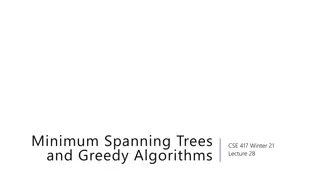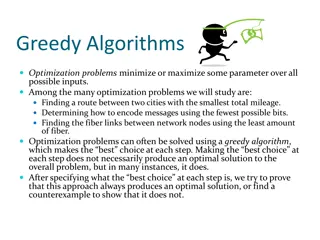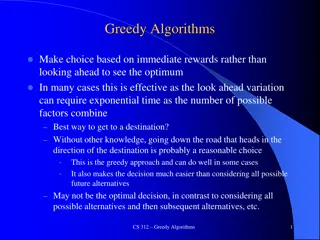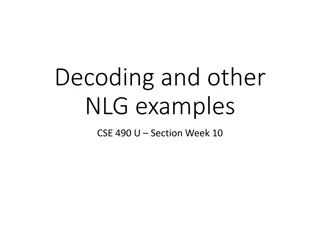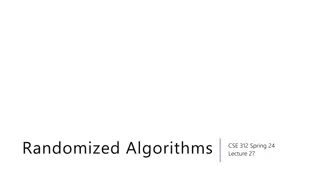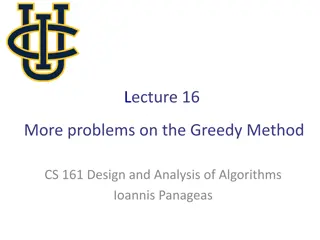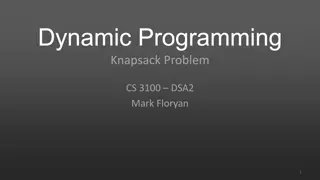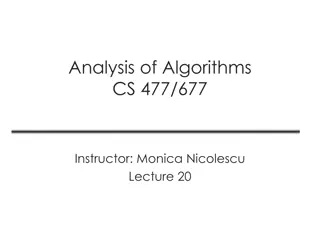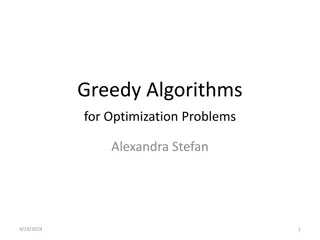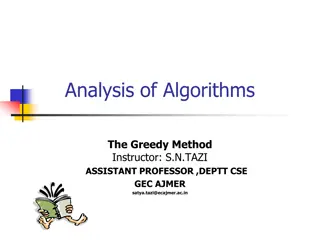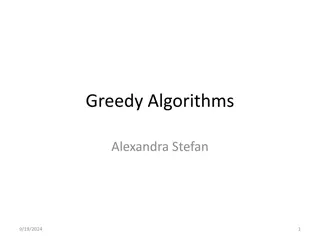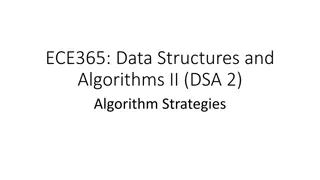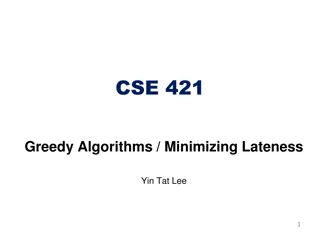GREEDY ALGORITHMS
Exploring the concept of greedy algorithms through examples like making change and problem-solving. Understand how local decisions lead to globally optimal solutions. Dive into the principles of algorithms versus heuristics and the divide-and-conquer approach. Discover practical applications in problem-solving and optimization.
Download Presentation

Please find below an Image/Link to download the presentation.
The content on the website is provided AS IS for your information and personal use only. It may not be sold, licensed, or shared on other websites without obtaining consent from the author.If you encounter any issues during the download, it is possible that the publisher has removed the file from their server.
You are allowed to download the files provided on this website for personal or commercial use, subject to the condition that they are used lawfully. All files are the property of their respective owners.
The content on the website is provided AS IS for your information and personal use only. It may not be sold, licensed, or shared on other websites without obtaining consent from the author.
E N D
Presentation Transcript
GREEDY ALGORITHMS David Kauchak CS 140 Spring 2024
Admin Assignment 6 ChatGPT Collaboration
A problem Input: a number k Output: {np, nn, nd, nq}, where np+5nn+10nd+25nq=k and np+nn+nd+nqis minimized What is this problem? How would you state it in English?
Making change! Input: a number k Output: {np, nn, nd, nq}, where np+5nn+10nd+25nq=k and np+nn+nd+nq is minimized Provide (U.S.) coins that sum up to k such that we minimize the number of coins
Making change! Input: a number k Output: {np, nn, nd, nq}, where np+5nn+10nd+25nq=k and np+nn+nd+nq is minimized Algorithm to solve it?
Making change! Input: a number k Output: {np, nn, nd, nq}, where np+5nn+10nd+25nq=k and np+nn+nd+nq is minimized pick as many quarters as we can ??= ? / 25 Solve: ??+ 5??+ 10??=k 25 ? / 25 recurse
Algorithms vs heuristics What is the difference between an algorithm and a heuristic? Algorithm: a set of steps for arriving at the correct solution Heuristic: a set of steps that will arrive at some solution
Making change! pick as many quarters as we can ??= ? / 25 Solve: ??+ 5?? + 10?? =k 25 ? / 25 recurse Algorithm or heuristic? Need to prove its correct!
Greedy algorithms What is a greedy algorithm? Algorithm that makes a local decision with the goal of creating a globally optimal solution Method for solving problems where optimal solutions can be defined in terms of optimal solutions to sub-problems What does this mean? Where have we seen this before?
Divide and conquer Divide and conquer To solve the general problem: Break into sum number of sub problems, solve: then possibly do a little work
Divide and conquer Divide and conquer To solve the general problem: The solution to the general problem is solved with respect to solutions to sub-problems!
Greedy vs. divide and conquer Greedy To solve the general problem: Pick a locally optimal solution and repeat
Greedy vs. divide and conquer Greedy To solve the general problem: The solution to the general problem is solved with respect to solutions to sub-problems! Slightly different than divide and conquer
Greedy vs. DP greedy Only recurse on one subproblem dynamic programming Need to solve (recurse on) subproblems to figure out optimal answer
Proving correctness: greedy choice property Greedy choice property: The greedy choice is contained within some optimal solution The greedy choice results in an optimal solution
Making change! pick as many quarters as we can ??= ? / 25 Solve: ??+ 5?? + 10?? =k 25 ? / 25 recurse {?1,?2,?3, ,??} solution: individual coins selected
Proving greedy choice property Option 1: proof by contradiction Assume you have an optimal solution to the problem Sometimes you have to think about it ordered/arranged a particular way Assume that somewhere along the way the solution contains a decision that is different than your greedy algorithm Argue this results in a contradiction, i.e., that the solution you re considering is not optimal
Greedy choice property Proof by contradiction: Let {?1,?2,?3, ,??} be an optimal solution Assume it is ordered from largest to smallest Assume that it does not make the greedy choice at some coin ?? ?1,?2,?3, ,??, ,?? ?1 ?2,?3, ,??, ,?? Any problem contradiction?
Greedy choice property Proof by contradiction: ?1,?2,?3, ,??, ,?? ?1 ?2,?3, ,??, ,?? gi > ci. We need at least one more lower denomination coin because gi can be made up of ci and one or more of the other denominations but that would mean that the solution is longer than the greedy!
Greedy choice property gi > ci gi = 5 ci = 1 there are at least 4 other pennies could always replace 5 pennies with a nickel to create shorter solution!
Greedy choice property gi > ci gi = 10 ci = 5 there are at least 2 nickels (assuming we ve dealt with pennies first) could always replace those coins with a dime to create a shorter solution
Greedy choice property gi > ci gi = 25 r = remaining sum coins(r 25): number of coins to get remaining sum - 25 ci = 10: 10 + 10 + 5 + coins(r-25) ci = 5: 5 + 5 + 5 + 5 +5 + coins(r-25) The greedy solution will always be better
Greedy choice property fails Coins: 9, 4, 1 What s the best way to make 12?
Greedy choice property fails Coins: 9, 4, 1 gi > ci gi = 9 r = remaining sum coins(r 9): number of coins to get remaining sum - 9 ci = 4: 4 + coins(r-4) There is no way to guarantee that we would have to use the same set of coins are coins(r-9)
Interval scheduling Given n activities A = [a1,a2, .., an] where each activity has start time si and a finish time fi. Schedule as many as possible of these activities such that they don t conflict.
Interval scheduling Given n activities A = [a1,a2, .., an] where each activity has start time si and a finish time fi. Schedule as many as possible of these activities such that they don t conflict. Which activities conflict?
Interval scheduling Given n activities A = [a1,a2, .., an] where each activity has start time si and a finish time fi. Schedule as many as possible of these activities such that they don t conflict. Which activities conflict?
Simple recursive solution Enumerate all possible solutions and find which schedules the most activities
Simple recursive solution Is it correct? max{all possible solutions} Running time? O(n!)
Can we do better? Dynamic programming O(n2) Greedy solution Is there a way to repeatedly make local decisions? Key: we d still like to end up with the optimal solution
Overview of a greedy approach Greedily pick an activity to schedule Add that activity to the answer Remove that activity and all conflicting activities. Call this A . Repeat on A until A is empty
Greedy options Select the activity that starts the earliest, i.e. argmin{s1, s2, s3, , sn}?
Greedy options Select the activity that starts the earliest, i.e. argmin{s1, s2, s3, , sn}? non-optimal
Greedy options Select the shortest activity, i.e. argmin{f1-s1, f2-s2, f3-s3, , fn-sn}
Greedy options Select the shortest activity, i.e. argmin{f1-s1, f2-s2, f3-s3, , fn-sn} non-optimal
Greedy options Select the activity with the smallest number of conflicts
Greedy options Select the activity with the smallest number of conflicts
Greedy options Select the activity with the smallest number of conflicts
Greedy options Select the activity that ends the earliest, i.e. argmin{f1, f2, f3, , fn}?
Greedy options Select the activity that ends the earliest, i.e. argmin{f1, f2, f3, , fn}? remove the conflicts
Greedy options Select the activity that ends the earliest, i.e. argmin{f1, f2, f3, , fn}?
Greedy options Select the activity that ends the earliest, i.e. argmin{f1, f2, f3, , fn}?
Greedy options Select the activity that ends the earliest, i.e. argmin{f1, f2, f3, , fn}? remove the conflicts
Greedy options Select the activity that ends the earliest, i.e. argmin{f1, f2, f3, , fn}?
Greedy options Select the activity that ends the earliest, i.e. argmin{f1, f2, f3, , fn}?
Greedy options Select the activity that ends the earliest, i.e. argmin{f1, f2, f3, , fn}?
Greedy options Select the activity that ends the earliest, i.e. argmin{f1, f2, f3, , fn}?
Greedy options Select the activity that ends the earliest, i.e. argmin{f1, f2, f3, , fn}? Multiple optimal solutions
Greedy options Select the activity that ends the earliest, i.e. argmin{f1, f2, f3, , fn}?



